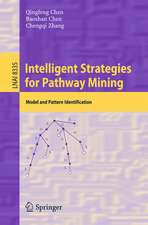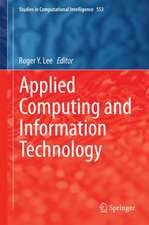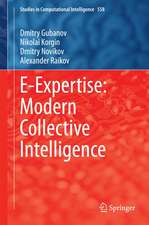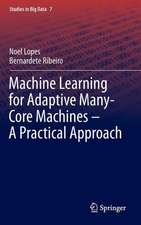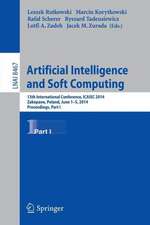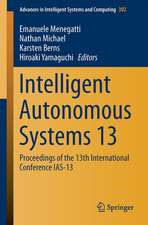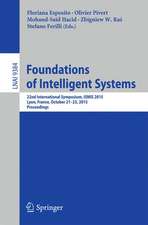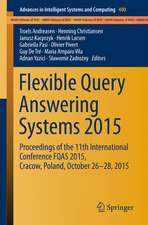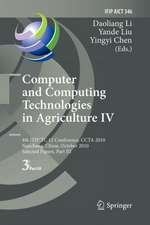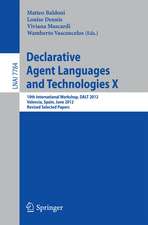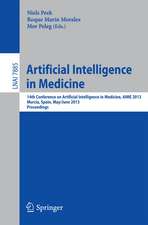Scalable Uncertainty Management: 11th International Conference, SUM 2017, Granada, Spain, October 4-6, 2017, Proceedings: Lecture Notes in Computer Science, cartea 10564
Editat de Serafín Moral, Olivier Pivert, Daniel Sánchez, Nicolás Marínen Limba Engleză Paperback – 14 sep 2017
Managing uncertainty and inconsistency has been extensively explored in Artificial Intelligence over a number of years. Now, with the advent of massive amounts of data and knowledge from distributed, heterogeneous, and potentially conflicting sources, there is interest in developing and applying formalisms for uncertainty and inconsistency in systems that need to better manage this data and knowledge. The International Conference on Scalable Uncertainty (SUM) aims to provide a forum for researchers who are working on uncertainty management, in different communities and with different uncertainty models, to meet and exchange ideas.
Din seria Lecture Notes in Computer Science
- 20%
 Preț: 1061.55 lei
Preț: 1061.55 lei - 20%
 Preț: 307.71 lei
Preț: 307.71 lei - 20%
 Preț: 438.69 lei
Preț: 438.69 lei - 20%
 Preț: 579.30 lei
Preț: 579.30 lei -
 Preț: 410.88 lei
Preț: 410.88 lei - 17%
 Preț: 427.22 lei
Preț: 427.22 lei - 20%
 Preț: 596.46 lei
Preț: 596.46 lei - 15%
 Preț: 448.04 lei
Preț: 448.04 lei - 20%
 Preț: 353.50 lei
Preț: 353.50 lei -
 Preț: 389.49 lei
Preț: 389.49 lei - 20%
 Preț: 309.90 lei
Preț: 309.90 lei - 20%
 Preț: 645.28 lei
Preț: 645.28 lei - 20%
 Preț: 763.23 lei
Preț: 763.23 lei - 15%
 Preț: 580.46 lei
Preț: 580.46 lei - 20%
 Preț: 310.28 lei
Preț: 310.28 lei - 20%
 Preț: 655.02 lei
Preț: 655.02 lei - 20%
 Preț: 1183.14 lei
Preț: 1183.14 lei - 20%
 Preț: 340.32 lei
Preț: 340.32 lei -
 Preț: 449.57 lei
Preț: 449.57 lei - 20%
 Preț: 591.51 lei
Preț: 591.51 lei - 18%
 Preț: 938.83 lei
Preț: 938.83 lei - 20%
 Preț: 337.00 lei
Preț: 337.00 lei - 20%
 Preț: 649.50 lei
Preț: 649.50 lei - 20%
 Preț: 607.40 lei
Preț: 607.40 lei - 20%
 Preț: 1414.79 lei
Preț: 1414.79 lei - 20%
 Preț: 1024.44 lei
Preț: 1024.44 lei - 20%
 Preț: 583.40 lei
Preț: 583.40 lei - 20%
 Preț: 453.32 lei
Preț: 453.32 lei - 20%
 Preț: 575.49 lei
Preț: 575.49 lei - 20%
 Preț: 1075.26 lei
Preț: 1075.26 lei - 20%
 Preț: 585.88 lei
Preț: 585.88 lei - 20%
 Preț: 825.93 lei
Preț: 825.93 lei - 17%
 Preț: 360.20 lei
Preț: 360.20 lei - 20%
 Preț: 763.23 lei
Preț: 763.23 lei - 20%
 Preț: 340.32 lei
Preț: 340.32 lei - 20%
 Preț: 504.58 lei
Preț: 504.58 lei - 20%
 Preț: 369.13 lei
Preț: 369.13 lei - 20%
 Preț: 580.93 lei
Preț: 580.93 lei - 20%
 Preț: 343.62 lei
Preț: 343.62 lei - 20%
 Preț: 350.21 lei
Preț: 350.21 lei - 20%
 Preț: 583.40 lei
Preț: 583.40 lei - 20%
 Preț: 583.40 lei
Preț: 583.40 lei - 15%
 Preț: 438.59 lei
Preț: 438.59 lei - 20%
 Preț: 341.95 lei
Preț: 341.95 lei - 20%
 Preț: 238.01 lei
Preț: 238.01 lei - 20%
 Preț: 538.30 lei
Preț: 538.30 lei
Preț: 340.49 lei
Preț vechi: 425.62 lei
-20% Nou
Puncte Express: 511
Preț estimativ în valută:
65.16€ • 70.75$ • 54.73£
65.16€ • 70.75$ • 54.73£
Carte tipărită la comandă
Livrare economică 22 aprilie-06 mai
Preluare comenzi: 021 569.72.76
Specificații
ISBN-13: 9783319675817
ISBN-10: 3319675818
Pagini: 438
Ilustrații: XIX, 438 p. 57 illus.
Dimensiuni: 155 x 235 mm
Greutate: 0.64 kg
Ediția:1st ed. 2017
Editura: Springer International Publishing
Colecția Springer
Seriile Lecture Notes in Computer Science, Lecture Notes in Artificial Intelligence
Locul publicării:Cham, Switzerland
ISBN-10: 3319675818
Pagini: 438
Ilustrații: XIX, 438 p. 57 illus.
Dimensiuni: 155 x 235 mm
Greutate: 0.64 kg
Ediția:1st ed. 2017
Editura: Springer International Publishing
Colecția Springer
Seriile Lecture Notes in Computer Science, Lecture Notes in Artificial Intelligence
Locul publicării:Cham, Switzerland
Cuprins
Invited papers.- Maximum likelihood estimation and coarse data.- Reasons and Means to Model Preferences as Incomplete.- Fuzzy Description Logics - A Survey.- Regular papers.- Using k-specificity for the management of count restrictions in flexible querying.- Comparing Machine Learning and Information Retrieval-based Approaches for Filtering Documents in a Parliamentary Setting.- Eliciting Implicit Evocations using Word Embeddings and Knowledge Representation.- K-nearest neighbour classification for interval-valued data.- Estimating Conditional Probabilities by Mixtures of Low Order Conditional Distributions.- Closed-Form Solutions in Learning Probabilistic Logic Programs by Exact Score Maximization.- Fault Tolerant Direct NAT Structure Extraction from Pairwise Causal Interaction Patterns.-The Altruistic Robot: do what I want, not just what I say.- Expressivity of possibilistic preference networks with constraints.- Assumption-Based Argumentation Equipped with Preferences and Constraints.- Semantic Change and Extension Enforcement in Abstract Argumentation.- Measuring Disagreement in Argumentation Graphs.- Belief in Attacks in Epistemic Probabilistic Argumentation.- A Parametrized Ranking-based Semantics for Persuasion.- A Probabilistic Programming Language for Influence Diagrams.- First-Order Typed Model Counting for Probabilistic Conditional Reasoning at Maximum Entropy.- Towards Statistical Reasoning in Description Logics over Finite Domains.- Bankruptcy Scenario Query: B-SQ.- A view of f-indexes of inclusion under different axiomatic definitions of fuzzy inclusion.- An integer 0-1 linear programming approach for computing inconsistency degree in product-based possibilistic DL-Lite.- A Semantic characterization for ASP base revision.- On Iterated Contraction: syntactic characterization, representation theorem and limitations of the Levi identity.- Handling Topical Metadata Regarding the Validity and Completeness of Multiple-Source Information: A possibilistic approach.- Aggregation of preferences on criteria importance expressed on various subsets by several decision makers.- Short papers.- Probabilistic local link prediction in complex networks.- A Fuzzy Ontology-based System for Gait Recognition using Kinect Sensor.- Evidential joint calibration of binary SVM classifiers using logistic regression.- Ad hoc metric for correspondences analysis between fuzzy partitions On Similarity-based Unfolding.- The Causality/Repair Connection in Databases: Causality-Programs.
Caracteristici
Includes supplementary material: sn.pub/extras



